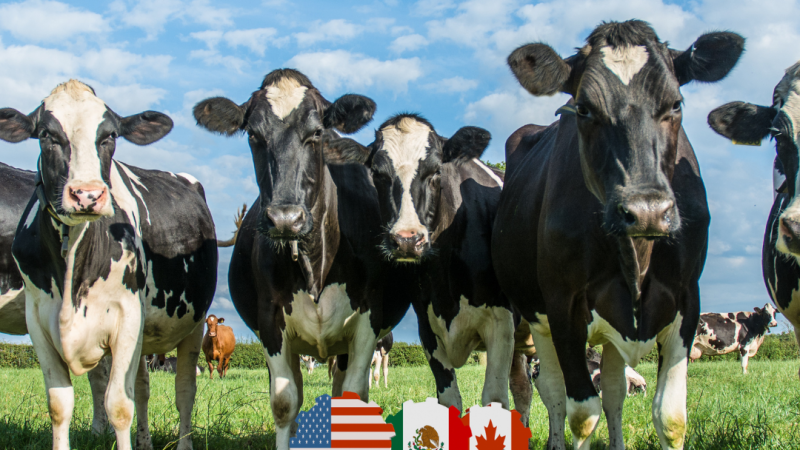A recent ruling related to trade between the United States and Canada has “significant economic implications” for U.S. dairy producers, according to a spokesperson for Edge Dairy Farmer Cooperative.
Karen Gefvert, director of government affairs for the Green Bay-based co-op, yesterday said a ruling by a dispute settlement panel established under the U.S.-Mexico-Canada Agreement means American dairy producers will continue to miss out on export opportunities in Canadian markets.
As part of an ongoing dispute over trade between the two countries, U.S. trade officials argue Canada is unfairly limiting export opportunities for domestic dairy farmers and processors.
In a panel proceeding established under the USMCA, the U.S. challenged Canada’s dairy tariff rate quota allocation measures, which use a “market-share approach” for determining allocations, a release from the Office of the U.S. Trade Representative shows. In a final decision, two of the three panelists found these measures don’t breach USMCA commitments referenced in the U.S. challenge.
But Gefvert yesterday said Canada’s measures essentially represent a Catch-22 for those seeking to get their products on Canadian supermarket shelves.
“Applicants, to be eligible to export into Canada, must be active in the Canadian food, ag sector at the time of application, and then must remain active during that quota year … So the concern there was, those who want to gain access really can’t, because they’re not already participating in, they’re not already active in the Canadian food sector,” she said.
The panel also reviewed other aspects of the U.S. argument, including how Canada established criteria for different “pools” of applicants, limits on who can apply for and receive the dairy tariff rate quota, and Canada’s process for returning and re-allocating unused quota allocations, Gefvert explained.
She said the U.S. argued Canada’s measures introduce new conditions or limits on eligibility for these lower tariff rates, altering what the United States thought was established in the original agreement.
“This wasn’t the agreement that the U.S. thought that they had been making, and the additional access to dairy markets with our trading partners to the north really didn’t come to fruition as it had intended,” she said.
Canada and Mexico are top two U.S. trading partners for dairy goods, with more than $1 billion in U.S. dairy exports going to Canada last year alone, Gefvert noted. Canada is also the largest export market for goods made in Wisconsin, according to the Wisconsin Economic Development Corp.
“The Canadian marketplace is a substantial market, and the anticipated economic benefits just weren’t realized, unfortunately,” she said. “So that means less ability to export product, which is revenue generation for processors and for dairy farmers … so there are some significant economic implications to this lack of market access.”
In a statement on the panel ruling, Agriculture Secretary Tom Vilsack noted the U.S. won an earlier USMCA case related to Canada’s trade rate quota allocation system.
“Although we are disappointed in the outcome of this second case, we brought this case to refine and expand upon our win in the first case,” he said. “We will continue to voice deep concerns about Canada’s system.”
Meanwhile, U.S. Trade Representative Katherine Tai argued Canada’s policy revisions following the initial U.S. trade dispute win “have still not fixed the problem” for U.S. dairy farmers.
“We will continue to work to address this issue with Canada, and we will not hesitate to use all available tools to enforce our trade agreements and ensure that U.S. workers, farmers, manufacturers, and exporters receive the full benefits of the USMCA,” she said.
Following the ruling — which can’t be appealed, according to Gefvert — the path ahead is up to Tai, she said.
“There are probably a variety of different avenues the United States can take,” Gefvert said. “Probably the biggest would be looking at reopening USMCA, which I think is an incredibly heavy lift, which is probably unlikely. But that’s always on the table.”
See the Edge release: https://www.wisbusiness.com/2023/edge-dairy-farmer-cooperative-disappointed-by-usmca-panel-ruling/
See the USTR release: https://ustr.gov/about-us/policy-offices/press-office/press-releases/2023/november/usmca-panel-releases-canada-dairy-report-biden-harris-administration-will-continue-seeking-full
–By Alex Moe



